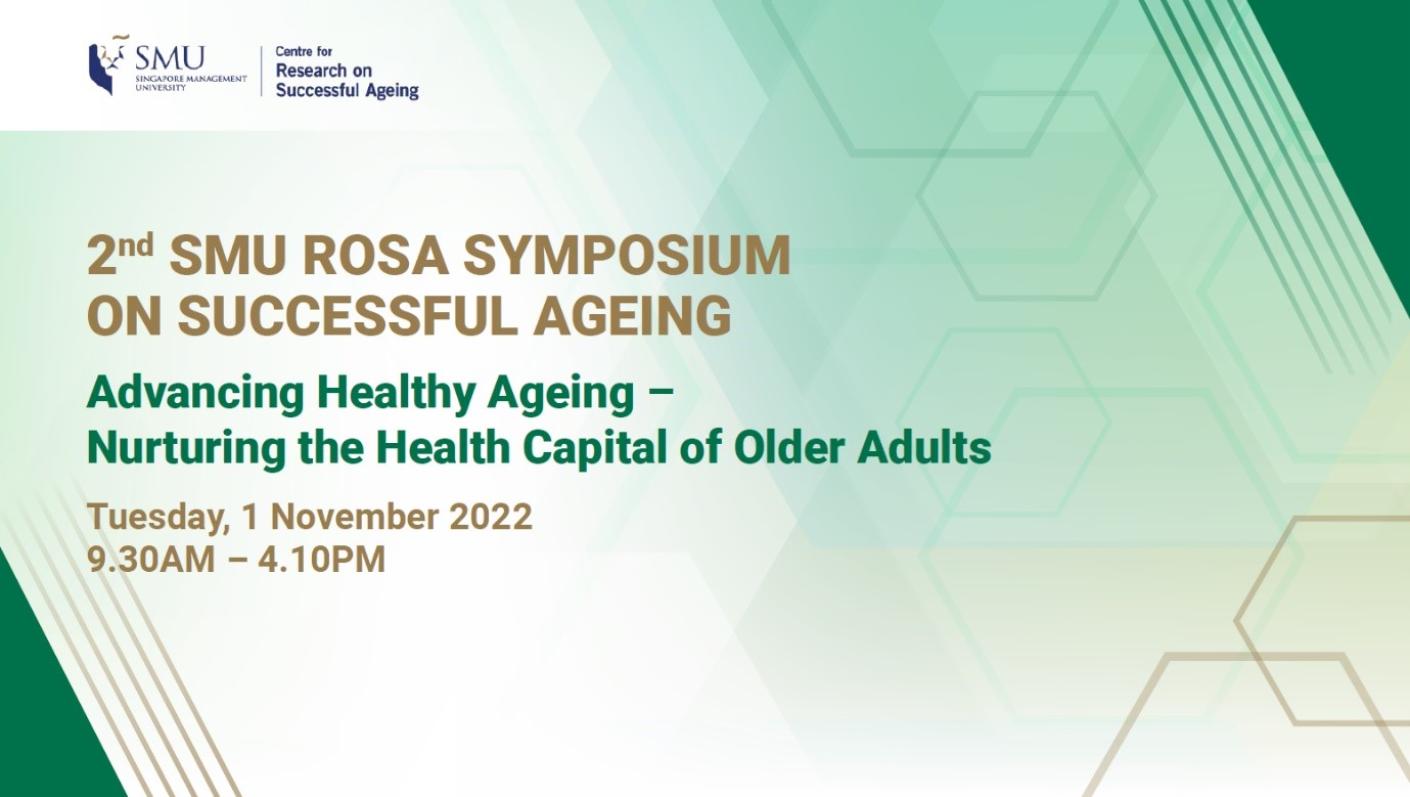
2nd SMU ROSA Symposium on Successful Ageing
The 2nd Annual ROSA Symposium on Successful Ageing took place on the 1st of November 2022 in the newly opened School of Social Sciences/College of Integrative Studies (SOSS/CIS) building at the Singapore Management University (SMU). Themed "Advancing Healthy Ageing – Nurturing the Health Capital of Older Adults", the hybrid event covered topics on promoting healthy ageing, improving the functional ability of older adults, and addressing the care and research challenges of multimorbidity and polypharmacy. The findings, unveiled and discussed during the symposium, highlighted the importance of employing a whole-of-society approach in enabling preventive approaches to healthcare.
The symposium was organised into two segments – a morning seminar on the topic of healthy ageing in Singapore and an afternoon keynote lecture and panel discussion. We aimed for this event to serve as a platform to stimulate new ideas and strategies to empower older adults to take charge of their personal health and help us uncover the key factors that will facilitate a longer healthspan for all.
In total, over 266 participants attended the Symposium both physically and virtually. For the first time, 59 members from ROSA’s Singapore Life Panel® attended the event.
SEMINAR ON HEALTHY AGEING IN SINGAPORE
We kickstarted the morning segment of the Symposium with a seminar on the topic of ‘healthy ageing’ and the opportunities and challenges that it represents in the Singapore context. The seminar consisted of a total of six presentations by leading ageing researchers and scholars and two discussion sessions for in-person attendees. Please find a brief synopsis of each of the presentations and discussions below.
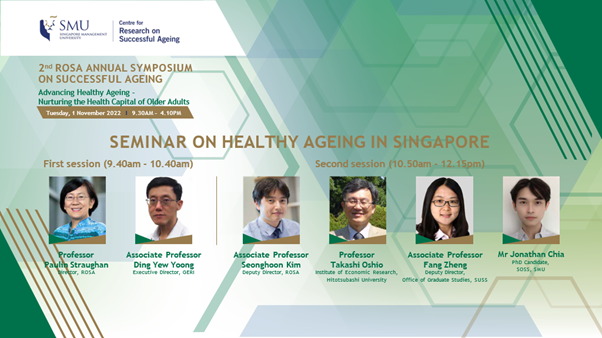 |
PRESENTATIONS
1. “Healthy ageing in the COVID-19 era” by Associate Professor Ding Yew Yoong, Executive Director and Principal Investigator, Geriatric Education & Research Institute (GERI)
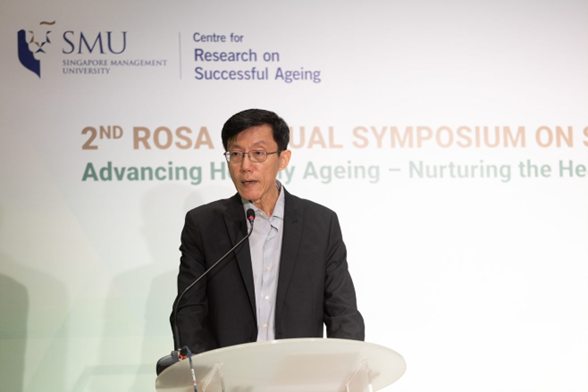 |
In his opening lecture, Associate Professor Ding the outlined the challenges to maintaining functional ability among older adults in the COVID-19 era and discussed the importance of strengthening both intrinsic capacity and extrinsic environments. Below is a summary of key findings from Associate Professor Ding’s lecture:
- Healthy ageing is the process of developing and maintaining functional ability that enables well-being among older adults. Functional ability is influenced by intrinsic capacity, environment, and their interaction.
- The COVID-19 pandemic has provided an unexpected opportunity to observe the negative effects of reduced intrinsic capacity and less favourable environments on the well-being of older adults.
- Efforts to promote healthy ageing in the COVID-19 era requires the whole-of-society approach that incorporates preventive efforts targeting older adults’ intrinsic capacity, their social relationships and built environment, as well as health-social services and public policies that impact them.
2. "Strengthening Healthier SG: The importance of a whole-of-society approach” by Professor Paulin Straughan, Director and Principal Investigator, ROSA
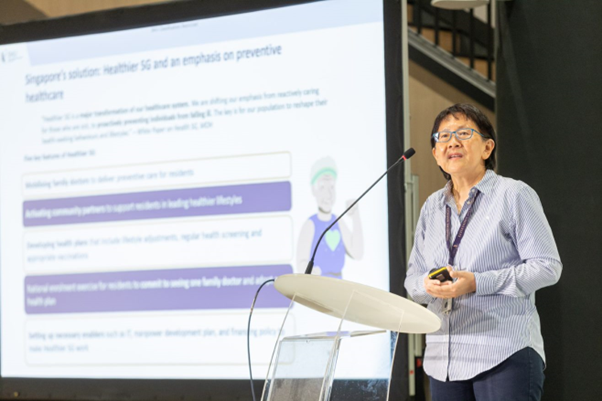 |
In her lecture, Professor Straughan presented on the importance of a whole-of-society approach in supporting Healthier SG, citing findings from the Singapore Life Panel (SLP) on significant factors influencing healthcare utilization and accessibility. Below is a summary of key findings from Professor Straughan’s lecture:
Healthier SG and other similar efforts to encourage preventive healthcare practices are important in addressing effects on healthcare systems due to population ageing.
- Healthcare utilization behaviors are a key aspect of encouraging preventive healthcare practices.
- Social and other contextual variables are important in enabling efforts to increase healthcare utilization and enable preventive healthcare.
- Healthier SG will require a whole-of-society approach to be effective. It cannot be seen as just a strictly ‘bio-medical’ intervention, but a psychological one as well.
FIRST DISCUSSION SESSION
For the first discussion session, physical attendees were given a prompt stating, “What do you think are the challenges to introducing/implementing Healthier SG in Singapore or in maintaining the functional ability of older adults?”Attendees were given 15 minutes to discuss the prompt together in small groups and then invited to share the points that were raised within their discussions with the wider audience. We hoped that facilitating these discussions among attendees would enable the sharing of unique perspectives on the issues being discussed, thereby making the presentations and discussions more meaningful for everyone.
The room was abuzz with diverse viewpoints that were coalesced by the need to develop a roadmap for healthy ageing in Singapore. We heard from an array of representatives from the SLP, Agency for Integrated Care, Geriatric Education & Research Institute , National Junior College, and overseas institutions.
Some of the key challenges raised by attendees to implementing Healthier SG and maintaining functional ability among older adults include deficits in awareness and knowledge of available healthcare providers and services; time constraints (e.g., long wait times, short consultations) and language barriers that impair patient-doctor relationships and overall healthcare experiences and outcomes; financial constraints faced by patients; and limited holistic care options (e.g., allied healthcare services). The implications that were drawn from this discussion were three-fold:
- Strengthening social networks to facilitate information sharing and social support
- Addressing time constraints on the part of healthcare practitioners and patients
- Ensuring that allied healthcare practitioners are included to provide for more holistic assessments
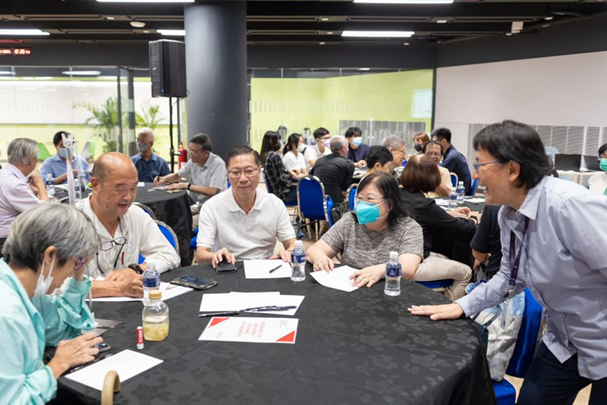 |
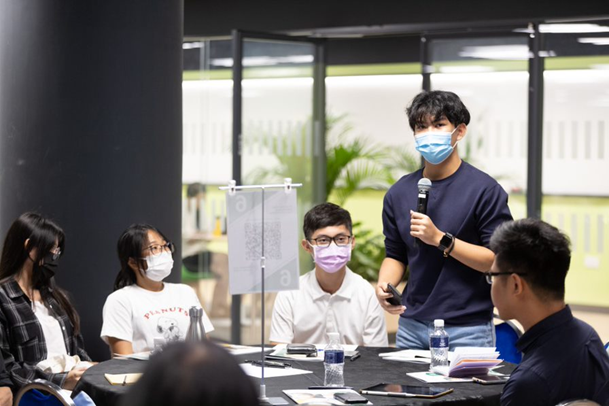 |
PRESENTATIONS
Following the first discussion session, we had four more presentations by esteemed faculty and scholars on the topics of (1) socioeconomic disparities in health outcomes, (2) health capacity to work, (3) lifelong learning and mental well-being, and (4) social participation and depression trajectories during the COVID-19 pandemic.
3. “How do health shocks affect health and labour market dynamics, and the socioeconomic-health gradient in older persons?” by Associate Professor Seonghoon Kim, Deputy Director, ROSA
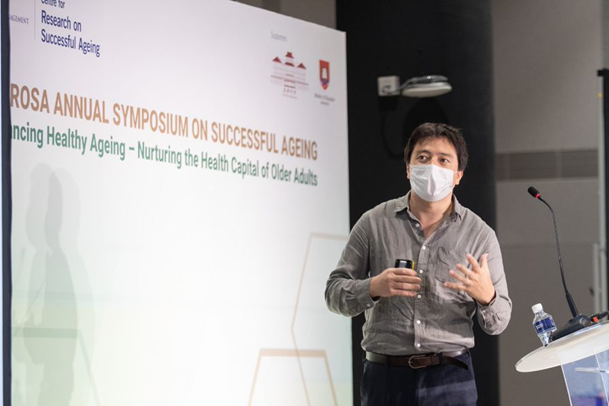 |
Associate Professor Kim graced the stage to present his original work that examined how work activity and health status are shaped by the onset of ill health among older Singaporeans across socioeconomic (SES) groups. Below is a summary of key findings from Associate Professor Kim’s presentation:
- We find that the dynamics of how self-assessed health recovers following the diagnosis of a major health shock do not vary significantly across SES groups.
- Work activity, however, varies significantly with low SES males and females being significantly less likely to be in active employment following the onset of ill health.
- What might explain the persistent health-SES gap for older Singaporeans?
- System-level factors such as differences in retirement and pension policy
- Due to heterogeneous retirement age and pension claiming eligibility by year and birth cohort, transition out of the labour force occurs much more gradually
4. “Health capacity to work among older Japanese people” by Professor Takashi Oshio, Institute of Economic Research, Hitotsubashi University
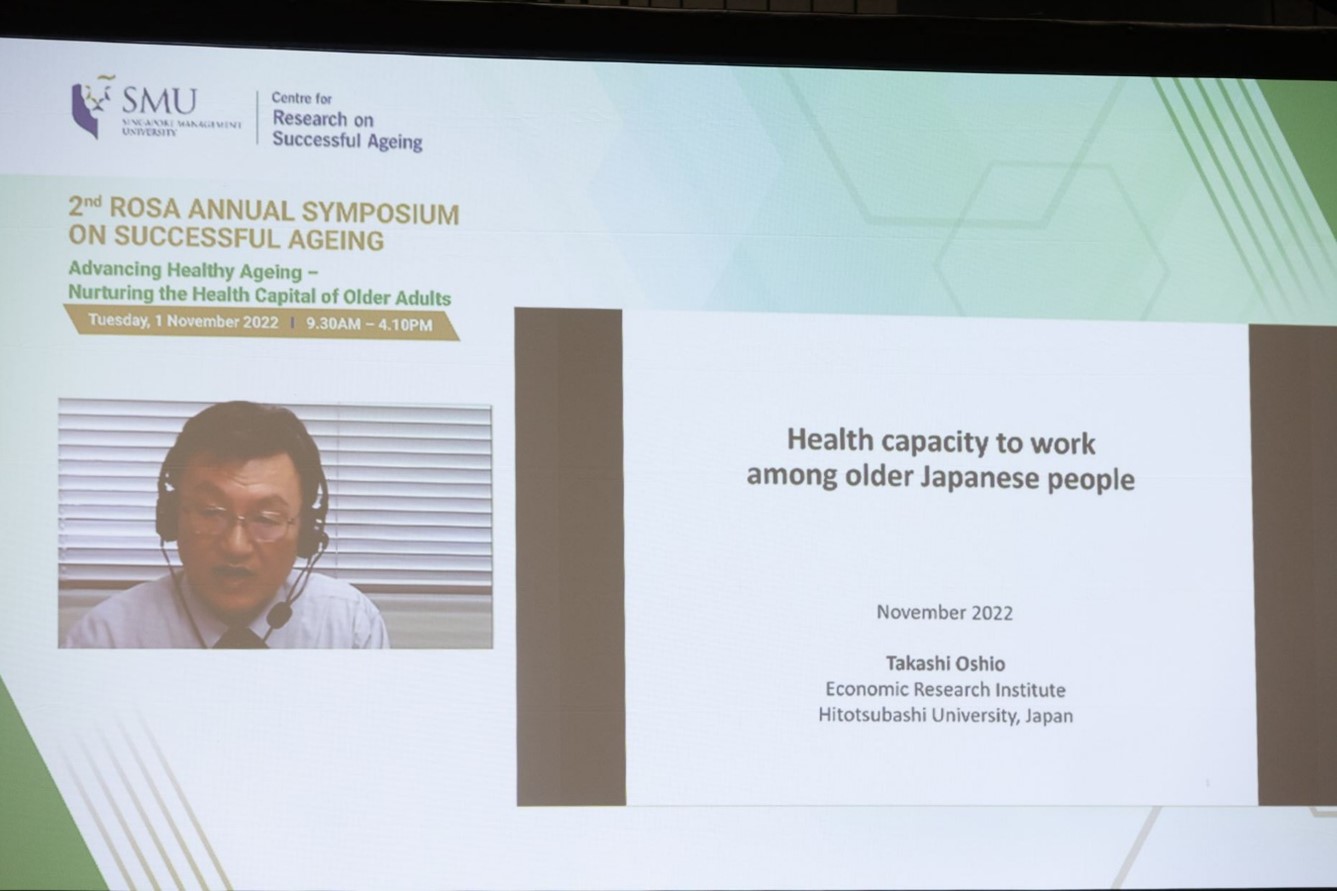 |
Professor Oshio gave a virtual presentation on health-work trajectories in the Japanese context. Using two well-established approaches to measuring how much longer a person can work given their health status, Professor Oshio found that there is an untapped work capacity of Japanese older adults who remain relatively healthy post-retirement. The results of his presentation suggested that encouraging older adults to work longer can partially mediate the pressures of an ageing population.
5. “Lifelong learning and mental well-being of older adults in Singapore” by Associate Professor Fang Zheng, Deputy Director of the Office of Graduate Studies, Singapore University of Social Sciences
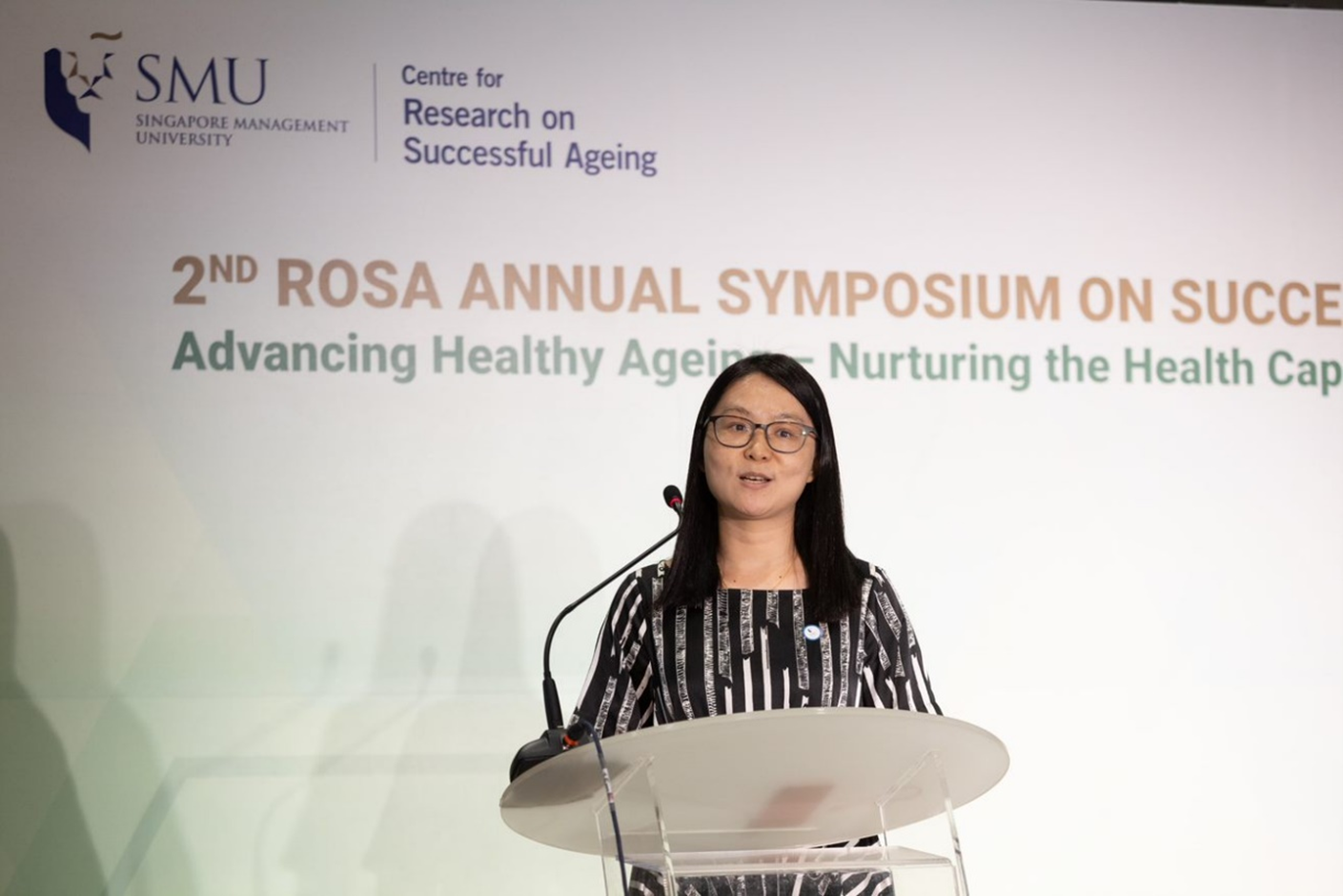 |
Associate Professor Fang Zheng shared preliminary evidence on the positive influence that lifelong learning might have on ageing and mental well-being. Below is a summary of the key findings from Associate Professor Fang Zheng’s presentation:
- More than 50% of older adults (in the study sample) who perceived lifelong learning positively had not participated in any lifelong learning-related activity in the past 12 months.
- Health and family relationship are the most important determinants of subjective well-being of older adults in Singapore.
- After health and family relationship, attending class is the most important predictor for quality of life and psychological well-being; participation in activities is the most important predictor of satisfaction with life (while learning attitude is even more important for quality of life).
6. “Profiles of social activity and depression trajectories as COVID-19 restrictions are relaxed” by Mr Jonathan Chia, ROSA PhD Scholar
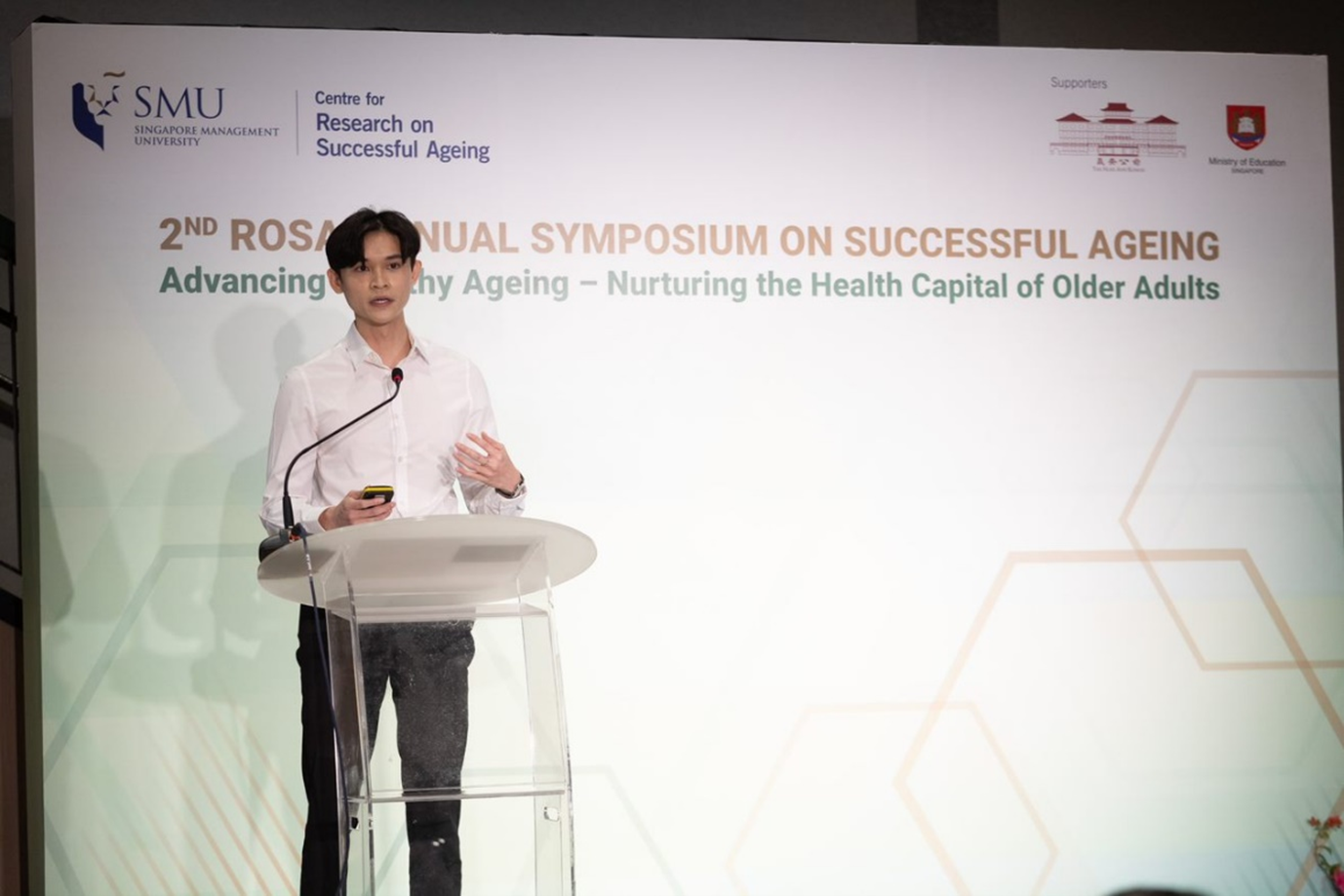 |
Mr Jonathan Chia presented his work on social activity patterns among older adult Singaporeans and implications for depression prevalence and recovery during the COVID-19 pandemic. Below is a summary of key findings from Mr Chia’s presentation:
- Digital contact more closely linked with lower baseline depression, as compared to other social activities.
- A broadly inactive lifestyle is associated with persistent depression.
- Broadly inactive individuals tend to have lower education and extroversion, and higher pre-pandemic negative affect.
Based on these findings, Mr Chia offered two practical implications, including the central role of digital technologies in ensuring for greater resilience and social engagement among older adults, and the importance of equitable access to social activities. He added that interventions should actively target older adults who may be less proactive in seeking out social activities.
SECOND DISCUSSION SESSION
For the second discussion session, physical attendees were given a new prompt stating, “What are the key dimensions beyond bio-medical factors in supporting healthy ageing?” Attendees were given another 15 minutes to discuss the prompt in smaller groups within their tables and then invited to share the points that were raised within their discussions with the wider audience.
Beyond bio-medical factors in supporting healthy ageing, attendees highlighted the importance of spiritual well-being (i.e., finding meaning and purpose in life), mental well-being (i.e., being cognitively engaged), and physical health. Some of the suggested initiatives and activities to support holistic well-being include joining programs (e.g., personal finance, 3P’s – painting, pottery, photography), volunteering, and adopting a healthy diet.
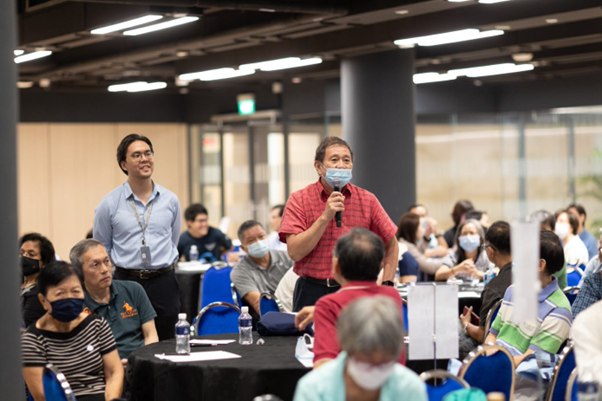 |
Welcome Address by Professor Lily Kong, President of SMU
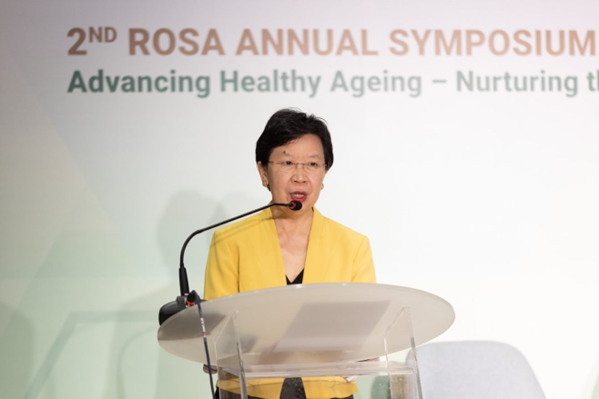 |
The afternoon segment of the symposium came to life with a riveting welcome address by our Guest of Honour, Professor Lily Kong, President of SMU. Professor Kong acknowledged the need to support healthy ageing and social sustainability in Singapore via preventive healthcare approaches, and to invest more in the human capital and intrinsic capabilities of our older adult population.
Keynote Lecture
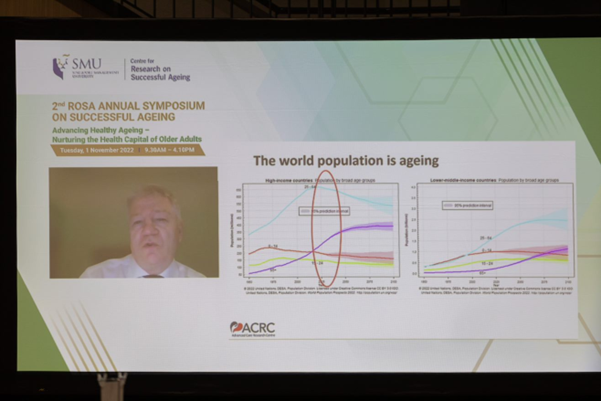 |
For the keynote segment of the symposium, we were honoured to have with us virtually, Professor Bruce Guthrie, Director of the Advanced Care Research Centre, University of Edinburgh, to impart strategies for adapting health systems to better address multimorbidity and polypharmacy in later life. Given that multimorbidity and polypharmacy make up most of the healthcare space and are set to rise precipitously, Professor Guthrie suggested the following ways in which health and social care systems can respond via a whole systems approach:
- Ensure health systems retain strong generalism
- Focus on specific problems that are common and important to people with multimorbidity
- Focus on high-volume processes predominately used by people with multimorbidity
- Focus on holistic care and care co-ordination
Keynote Panel Discussion
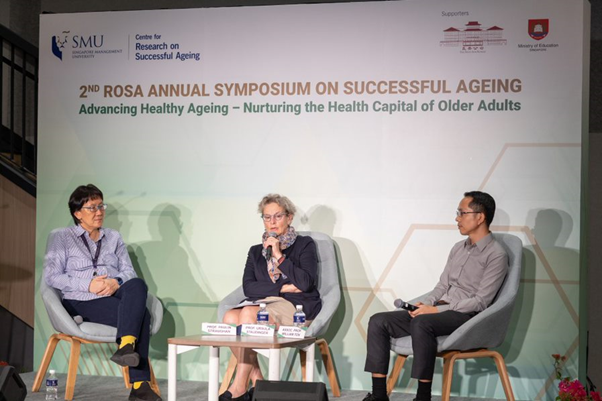 |
Joining the conversation, distinguished panellists Professor Ursula Staudinger, Rector of Technische Universität Dresden, Associate Professor William Tov, Deputy Director of ROSA, and Professor Straughan (moderator) settled on stage for a captivating discussion inspired by Professor Guthrie’s lecture and shaped by questions flowing in from the physical and virtual audience.
The transformative ideas that arose during the discussion were centred on shifting towards a preventive healthcare model that integrates care and centralizes data. Professor Staudinger advanced the notion of rewarding and incentivizing efforts to build the health capital of individuals, starting at the earliest stages of life, and putting in “scaffolding systems” that might enable a sharing of responsibilities among health professionals and provide for greater patient-centred care.
Associate Professor Tov highlighted the critical yet undervalued roles that social support and informal caregiving plays in preventive health. From a psychological standpoint, both Professor Staudinger and Associate Professor Tov agreed that individuals derive a tremendous sense of meaning and purpose through their social relationships, and that these factors are critical for healthy ageing.
In response to an audience member’s question on the kind of training that the next generation of health professionals would need to gain expertise in preventive health, Professor Guthrie argued that there are at least two major deficiencies at play. The first is that the focus of medical training remains on treatment rather than prevention. The second is that health professionals are not taught to work in teams. He proposed that greater interdisciplinarity is needed to overcome these deficiencies.
In conclusion, Professor Straughan emphasized the urgency of our current situation and asked how we can support our healthcare workers and normalise social engagement during times of crisis? The panellists reiterated a whole-of-society approach and suggested the need to harness community partners and resources and expand avenues of ‘social prescribing,’ which may better position us to support an ageing population over the coming years.
Closing
To conclude the 2nd Annual ROSA Symposium on Successful Ageing, Professor Straughan offered a few closing remarks and invited everyone in attendance to commemorate the day with a group photo in front of the stage.
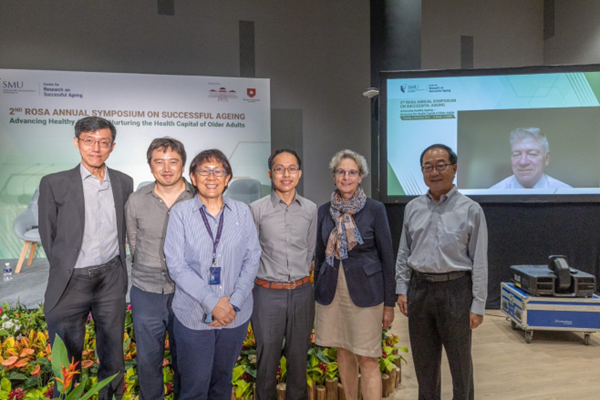 |
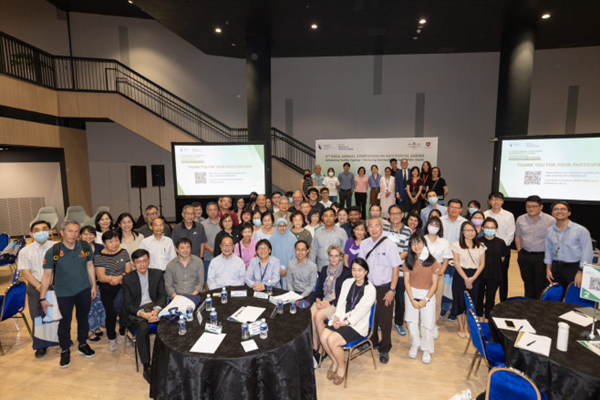 |
The ROSA team would like to extend our deepest gratitude to our Guest of Honour, President of SMU, Professor Kong for her support of ROSA’s work and for delivering the welcome address; our Keynote Speaker, Professor Guthrie; our esteemed panellists including Professor Staudinger and Associate Professor Tov; and to all of our fellow colleagues, students, and guests who contributed meaningfully to the discussions. The event was made possible with the generous support of The Ngee Ann Kongsi.
You may view the highlights of the event at the link here.
Should you like to receive any of the presentation decks from the Symposium, please write in to rosa@smu.edu.sg and we would be happy to share them.